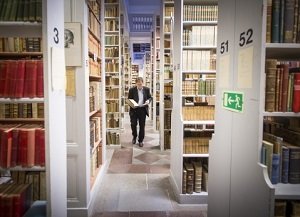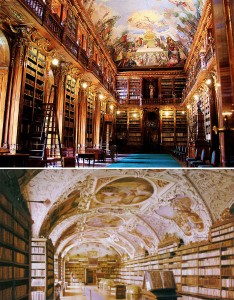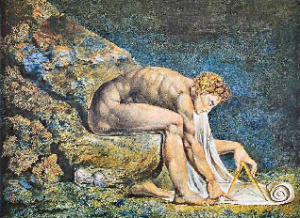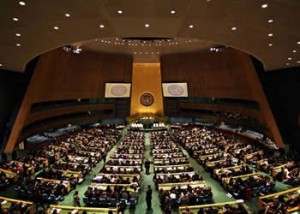
Manuscripts reading platform
A digital platform was launched by the library at the University of Uppsala offering works database scanned from cultural heritage collections, with handwritten works with surveys from handwriting recognition software.
cultural heritage collections, with handwritten works with surveys from handwriting recognition software.
The initiative was made from the competition with other software worldwide for applications become feasible to search for text, making available collections of enormous value not only historical but also economic, as noted by researcher Anders Brun of the University of Uppsala, as the site of this university.
The decoding of the manuscripts was made by a method that enables a computer to interpret a digital image of text using expertise, which uses a small portion of the material to identify the form and style of writing a small piece of text, then reading It is automated using standard experimental sample.
An interdisciplinary collaborative focus due to the relevance of the project to various humanities was needed, for example, the research done in the Vatican Library manuscripts, which if done without this digital process would cost a small fortune, explained Anders Brun on the website news University of Uppsala.
What is being learned online?
A new report on the MOOCs (Massive Open Online Courses) was published in late April and can show progress and setbacks in these new means of mass education.
can show progress and setbacks in these new means of mass education.
The report, again funded by the Bill & Melinda Gates (the first was also and did a post), was coordinated by George Siemens, a technology-academic expert at the University of Texas at Arlington, and states that the initial frenzied enthusiasm seems now a little milder: “It’s almost like now we passed by a shameful period in which we forget we were researching and how were scientists, hurried to make decisions and proclaim things that were not scientific whole,” he told the publication of Wired Campus .
The goal then this new report is to offer research topics: student engagement and learning success in a process of self-regulation and social learning, network analysis and network learning, including: motivation, attitude and criteria success.
Siemens understood the basics of networks, this might be embarrassing said that without the involvement of the students. “Now the subject of particular interest,” it is just a distraction from a distance and is “is literally just a click away” as the published report (download).
Five key research themes were identified in the report: student engagement and success of learning, Mooc´s design and curriculum, self-regulated learning and social learning, social network analysis and network learning, and motivation, attitude, and success criteria.
The names of student engagement reports as a prominent issue. Many students enrolled in MOOCs non-traditional, to make sure that they are involved and able to succeed in such a course is even more important.
The Siemens teacher said he hopes the report will help colleges to tomaem r intelligent decisions based on research and evidence, to create their digital campuses.
Technology, science and rebirth
The architecture of cirterciense monks, was followed by the Gothic cathedrals of medieval and technical advances arc usage (support span roofs and even bridges) was a product of the Middle Ages, the invention of the printing press (the Chinese movable type already there) and later internalized understanding (silent reading was new) was important as the first step towards the democratization of writing and learning “scholar” whose word has a Latin root “scholastic”.
and technical advances arc usage (support span roofs and even bridges) was a product of the Middle Ages, the invention of the printing press (the Chinese movable type already there) and later internalized understanding (silent reading was new) was important as the first step towards the democratization of writing and learning “scholar” whose word has a Latin root “scholastic”.
Among the most beautiful libraries in the world (see the list of top 10) is the Admont Abbey Admont founded in Austria in 1074 and 1776 embellished with golden tones, and the library and the library of the Strahov monastery in the Czech Republic beyond 1143, and indeed just cited, the monks built 3,500 libraries in the medieval world, knowing it was not popular was true, but it was a period of construction that culminated in the written press.
The dissemination of written culture through books, will start a learning process of democratization, which was not possible without the reproduction of books and even the invention of spectacles as much of the population was shortsighted, and allowed a faster propagation of ideas which paves the way for the expansion of reason, ideas and culture.
technology of great voyages allow not only the European maritime and commercial expansion, but will be the scientific advances that will discover an extraordinary number of new species of animals and plants, and new geological and climatic formations.
All this is in check including the technology itself, should I switch to a complex thought and look at the planet as a homeland for all, but you can not throw away the progress and advancement that rebirth gave rise, perhaps a new re-rebirth .
In the ceiling fresco of Strahov (pictured) made in the eighteenth century was called The humanity’s efforts for true wisdom, I think this is our effort.
Idealism, Phenomenology and policy
Much of the political schizophrenia which we live is in the grounds of thought, we say one thing and what’s happening next, put ultraconservative us to fix an advanced allegedly economy, and you arrive at the absurdity of seeing political colonels parading revolutionary, nothing more cynical .
and what’s happening next, put ultraconservative us to fix an advanced allegedly economy, and you arrive at the absurdity of seeing political colonels parading revolutionary, nothing more cynical .
Nothing more idealistic and somewhat “fundamentalism” ideological than argue that all problems were created by the reactionary media, by the distortion of the facts, while the phenomena around us (the value of things, the cost of any loan, short life) you can see that this is not propaganda but of facts, is still an objective idealism.
The definition of idealism is simple and complex, the subject thinks about things (objects), but it is all perception and the way that the subject (the person who thinks), but he’s come a long way since the development of Immanuel Kant to his questioning and synthesis in Hegel, which is an absolute idealism that reduces be consciousness.
The transcendental idealism of Kant is the doctrine that men are unable to understand exactly how things are in itself, create subjective representations constructed by human cognition, that is all just a representation of reality and not as it is.
There is an objective idealism, or Hegel upside: materialism.
It was Edmund Husserl who questioned this view of the phenomena, had in mind two questions: How can occur objective truth about what is out of consciousness itself? Since humans may be able to have reliable knowledge about what is not immanent to his senses? The idealism does not answer the two questions and answer in politics, but someone with no dogmatic political awareness answer yes corruptions, very committed education and health and prices ever higher on the day.
The thought of Husserl went through many twists and turns, reading his work in spite of alternative concepts equal terms, at different times, is visible three periods identified in their work start with a mathematical initial period, Brentano’s influence of 1887-1901, and a period of through hard idealistic about 1905-1927, and someone who returns to Being and ontology at the end of his life, in a work of maturity Cartesian Meditations (made at the Sorbonne in Paris in February 1929) he asks the transcendental subject : Which way the immanence of the I to the transcendence of the Other? And reconfigures psychology through phenomenology, is the beginning of ontological resumed.
Idealism or realism, immanent and transcendent
Realism and idealism are two competing philosophies, especially in the field of knowledge and education, from ancient Greece, these theories influence the philosophy of education up to the present day, and you do not know can join them.
and education, from ancient Greece, these theories influence the philosophy of education up to the present day, and you do not know can join them.
The idea is the basic idealism since it focuses on reason and reasoning and it is the way in which a person brings up the knowledge you have within you.
In his view, the world exists mainly in people’s minds and this is ultimate truth so we should have consistency of our ideas.
The more perfect are our ideas (in Cartesian rationalism they should be clear and distinct), the better we can serve, obey and live in the world.
In the idealism of Immanuel Kant, the world exists, but our mind is separated from it and can only perceive it through a transcendent act, that is the transcendent subject.
Realism is the school of educational thought it came from a student of Plato: Aristotle.
The only reality for him is the material world, the study of the outside world is the only reliable way to find the truth; the world is a phenomenon objective to which our mind must adhere in order to transform it.
But make no mistake St. Thomas Aquinas was also realistic and in his time the current that gave rise to modern idealism was called nominalism.
In Realism, a person is an empty vessel of knowledge (called tabula rasa), and this can only come out of being, through observation. This philosophy was the mother of the scientific method, a research system based on objective facts.
This idea of empty knowledge came the discussion of innate knowledge, immanent and transcendent.
Immanence is a religious and metaphysical concept that defends the existence of a supreme being and divine (or force) within the physical world (beyond the physical – meta-physis), this concept generally contrasts or coexists with the idea of transcendence depending on the philosopher and time.
Empiricism and rationalism
 The essential dispute between empiricism, which states that we are dependent on our sensory experience to conquer knowledge, and rationalism which states that the reason independent of experience, at least pure rationalism, is present in the representation of idea, namely that the rational knowledge “a priori” to indicate that it is then independent of experience.
The essential dispute between empiricism, which states that we are dependent on our sensory experience to conquer knowledge, and rationalism which states that the reason independent of experience, at least pure rationalism, is present in the representation of idea, namely that the rational knowledge “a priori” to indicate that it is then independent of experience.
These “tags” universal knowledge of the characteristics are universal, and here rationalism binds to Nominalists while empiricists believe that there is “a priori”, the man is a blank slate (tabula rasa is used by philosophers), and learn experiencing.
The experimentalism came first, with Francis Bacon (1561-1626) renewing Organon, the text on the Nature of Aristotle, for it calls Novum Organum, but lacks critical awareness, which will gradually be built in his disciples to reach David Hume (1711-1776).
It was a philosophical position that resorted to traditional metaphysics, Greek and scholastic, Aristotelian and Thomist, it will be reworked and will be one of the Renaissance impulses.
Between Hume and Bacon, from the historical point of view, Descartes (1596-1650) was a philosopher, physicist and mathematician, his debate with practical issues that judges obscure, writes in a letter to Mersenne, says “Conimbres are long, and good that they were short more (critical since then current even in the Company of Jesus’s schools) and dislikes of the first schools.
In 1619, traveled to United Kingdom and in the opinion of some biographies on 10 November, would have had a vision in a dream of a new mathematical and scientific system, but only in 1637 wrote his Discourse on Method, which are actually meditations.
Later was born in the UK, a philosophical movement that was somewhat the opposite, critical empiricism with John Locke and David Hume, who sees problems in its pure reason and his famous method.
It is the period that arises Isaac Newton (1642) (pictured Divine Geometra of William Brake) and also the final period of the Thirty Years War (1618-1648) that changes the map of Europe.
The idealism of Immanuel Kant (1724-1804) is an attempt to reconcile rationalism and empiricism, he wrote Critique of Pure Reason, but its important work is metaphysics, actually he is the founder of modernity, the little peak will last until Georg Hegel (1770-1831)
A “quarrel” between reason and names
This problem, which comes from classical antiquity, with Socrates, Plato and Aristotle is a problem today for science, or what we consider scientific in the true sense, but the heated dispute in the late Middle Ages, with nominalistic and realistic.
All part of a written Boethius (480-525 AD), in the early Middle Ages, who used a text (univesal quarrel) of Isagoge Porphyry (234-309 AD), see illumination-text side (photo), which stated:
“So he will avoid talking about the genders and species, on the question of whether they are subsistent realities in themselves or only consist of mere mental concepts or are tangible or intangible, or are separate or if there in sensible things and depend on them, since it relates to a matter that requires a thorough treatment and requires more examination.”1
The problem come the middle ages and was instrumental in establishing a first idea of rationalism, through logic and the construction of knowledge, but at the end of the Middle Ages, the so-called low average age the problem almost disappeared.
It was Peter Abelard, a monk who was player of Origen, who restated the thesis as a reinterpretation of the rank of species and genera Porphyry, but said the words (names) describe the world do not refer to the words in the physical sense (the sounds we emit when we speak), but the words as carriers of meaning.
It was through the reading of the writings of Aristotle on the soul and metaphysics, which in the thirteenth century Thomas Aquinas and Duns Scotus developed sophisticated forms of realism, however in the fourteenth century Wilheim of Ockham rejected the Aristotelian idea that intellectual knowledge resulted from the fact that our lie were informed by universal ideas resulting from perceived objects, replaces it with the Ockham’s razor.
Ockham’s razor is the idea that between a simple explanation of a certain thing and another complex, we get the simplest and therefore there is no “universal” that are innate.
For realists, a universal is a predicate being of others (or especially) all other entities. It exists objectively, as much as reality itself, transcendent in relation to the particular (Latin: universal ante rem) or as immanent in the individual things.
1Porfírio. Isagoge. Introduction, translation and notes of Juan José García Norro and Rogelio Rovira. Trilingual edition (Greek, Latin and Spanish). Barcelona: Anthropos Editorial, 2003, p. 2-3.
What is the role of the UN today?
Democracies in crisis, wars spread across the planet, and the role of the UN is the only security, many organizations and political organizations think not.
the UN is the only security, many organizations and political organizations think not.
The first UN meeting was held on April 25, 1945 so 70 years ago in the city of San Francisco in the US, with the presence of 51 governments and non-governmental organizations to draw up the United Nations Charter, but went on to be permanently available from of October 24, 1945.
His UN headquarters in New York though, has only four organs in this location, the International Court of Justice is located in The Hague, the Netherlands, and there are other bodies scattered locations across the world.
The current UN Secretary General, is the South Korean Ban Kim Moon, and the organization now has 193 UN Member States and only these states may vote at the UN.
See some of these agencies:
International Labour Organization (Geneva, Switzerland)
International Maritime Organization (London, UK)
International Monetary Fund (Washington, DC, United States)
International Telecommunication Union (Geneva, Switzerland)
United Nations Educational, Scientific and Cultural Organization (Paris, France)
World Food Programme (Rome, Italy)
But his main organ where the political dispute is fierce and where the ideological forces are concentrated is the Security Council,compound by 15 Member States, with 5 permanent members (China, France, Russia, United Kingdom, United States) and the other 10 members are temporary that are changed every two years ago, now are members Austria, Bosnia and Herzegovina, Brazil, Gabon, Japan, Lebanon, Mexico, Nigeria, Turkey and Uganda.
It is time to renew your role, you must create an international solidarity program to promote an end to poverty, prevent dictatorships and oppression, defend the right to education for all and especially to establish tolerance political, religious, gender and cultures.
Hubble, infinite and postmodernity
Twenty-five years ago, exactly on April 24, 1990, the space shuttle Discovery took off to put in orbit an observatory with a telescope Hubble, placed in orbit around the planet, that would change our view of the universe, our physical vision and perhaps the life.
orbit an observatory with a telescope Hubble, placed in orbit around the planet, that would change our view of the universe, our physical vision and perhaps the life.
It was observed points that were previously inaccessible to the human eye and were mysteries for researchers. As the Cat’s Eye Nebula (photo) detected in 2004, a nebula that is 3,000 years light of Earth, a nebula is a sun passing to eject their gases before settling as a solar star. As well as the nebulous Carina, 7500 light years from Earth, formed by gas and dust that allows astronomers to study details of star formation, the photo was captured in 2007.
The Copernican revolution that swept the geocentric vision, idea that the earth was the center of the universe, helped to release the ideal teocêntricos man confused and bring out the science and modernity, which now also are in crisis, but the fact that we see further may cause our myopia is exceeded and we start to look the Other not as an extension of self and the Same, but with equal rights that I.
Since the Third Meditation Cartesian, the philosopher Emmanuel Levinas established in their entirety and Infinite work, there is a break from the category of totality, which is based on the relationship between the cogito and the infinite idea developed in Descartes, and where Levinas extract your project to rethink the relationship between the Same and the Other ethics as first philosophy plan:
“And I do not believe that do not understand the infinite by a true idea, but only by a denial of the infinite .. unlike understand quite obvious that there is more reality in infinite substance than in finite and, therefore, that the perception of infinity is, in a way, me earlier perception of the finite, that is, the perception of God is prior to the perception of myself, for which reason it would give me that doubt, desire, that is, I am needy of something and I’m not totally perfect, if there was in me any idea of a more perfect being by comparison with which I know my faults?” (Descartes, 2004, p. 91-92).
Levinas reflects first about his “doubts everything” that conflicts with the external perception of the infinite idea, since it is no longer the cogito (systematic doubt) you think the infinite, but comes from the “I think” and should be the very idea of infinite substance (now seen by Hubble), the second is inadequate, because the infinite is not an overflow of ideatum, but the external relation that admits the experience with the new, the thoughtless and therefore outside the entirety.
In this infinite “thoughtless” that Levinas says Even the relationship with the other, “without the transcendence of cutting the ties that implies a relationship …” (Levinas, p. 35), and this way Levinas shows how modernity fixed this relationship on the basis of “I think” itself of modern rationalism, and this is the distance between the idea of the Other with ideatum standing in “transcendent being, the infinite is the absolutely other” (Levinas, Totalidade e Infinito, p . 35-36).
It is in this way that separates the infinite idea of Descartes that is the philosophical search for God’s existence, as in Levinas is linked to the search for a relationship between the Same and the Other, to keep the externality of the Other, and not attached to idea Same.
Descartes, R. Meditations on First Philosophy. Sao Paulo-Campinas: Editora da UNICAMP, Campinas, 2004.
Levinas, E. Totalidade e Infinito. Lisbon-Portugal, Edições 70, 1988.
The being, things and values
That being is fragmented, the speech and culture were fragmented in the course of modernity we all know, let’s call it liquid, gaseous or virtual, will not be the characteristic that solve and put back to life and society on track.
liquid, gaseous or virtual, will not be the characteristic that solve and put back to life and society on track.
Recognizing that the public and private spheres are divided and confused when they should not be just looking at the various levels of the “so-called public life” to know that certain estates (not classes) took public account and become private.
The deeper problem is one that separated us or leagues to things, be they money, technology or even intangible things like ideologies, ideas and religions, and we were not in physics, but the meta-physics that was abandoned.
The problem is that intangible things or are not recognized as such, or recognized are separate views of Being (not the subject, fragmentary category of modernity), since the things that catch (tangible) are seen as “appropriations” only and not as things that should also be conceived on the basis of Being, Husserl claimed: “We need to return things for themselves,” did not want the father of phenomenology separate it from being, but just the opposite building, or rebuilding ontological project.
Being is more general, Heidegger claimed, referring to Aristotelian metaphysics (book B, 4), we read:
By keeping the “being” is the most general concept, this can not mean that it is as clear and that does every other explanation. The concept of being is, on the contrary, the most obscure. (Heidegger. 1960, p. 3).
But we set the logical, well-made settings, where the Self is indefinable, but as real as anything that is tangible, and then we demand of Being it is.
Who is deepening and trying to understand the depth of this Being, the ontic sciences (the separate things of Being idealistic project) does not account for themselves, says Heidegger:
Every ontology, however rich and highly structured to be the system of categories available to it, remains blind and works for the falsification of its most authentic intention, provided that does not begin with sufficiently clarify the meaning of being, and waive understand this clarification as its fundamental task. (Heidegger. 1960, p. 11).
Calls Edgar Morin’s “Hhead well made”, teach everything, but does not teach a man to learn to live, to be a citizen, etc. early in the book, Chapter 2 uses the philosopher Blaise Pascal’s quote “does not teach men to be honest,” we might add from the head well made: not combine the knowledge giving them sense, does not teach the human condition and their relationship with nature, which sets limits for us (I include the two authors) ontology (being) precedes ethics, contrary to what liquids speculators (Bauman & others) think the net of modernity.
HEIDEGGER, Martin. Sein und Zeit. Tübingen: Max Niemeyer, 1960.

